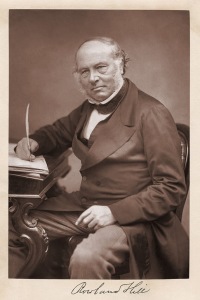The nineteenth century was a wonderful time for progress. Rapid scientific advances and technological innovations created a mindset that change was possible, even preferable, and that change could be a positive force. The current attitude is “if it ain’t broke, don’t fix it.” In the nineteenth century, people looked for better ways to do things. People like Thomas Edison didn’t happen upon new ideas; they actively looked for things to invent. Rowland Hill wasn’t just an innovator; he called himself a “Reformer.” He turned his attention to Great Britain’s postal service in 1838, and philately is the result.
Postal Service worldwide was always slow, expensive, and a bureaucratic mess. Great Britain was no worse than many countries, but costly and cumbersome postal service was becoming a problem for England’s increasingly powerful business class. Letters in 1838 were charged by weight and the number of sheets of paper that were sent (that is why folded letters, essentially one piece of paper that was written on and folded up to resemble a letter, were so popular). Letters could be sent prepaid or collect. Most were sent collect for the simple reason that service was unreliable, and the surest way to guarantee delivery was to have the letter paid for when it arrived. This meant that with each delivery of the mail, the postal agent needed to examine each delivered letter and figure out what was owed, which varied letter to letter depending on where it came from and its weight. Delivery, needless to say, was slow. Rates were so high that postal customers resorted to subterfuge to cut costs. Members of Parliament enjoyed the Free Frank—their signature on a letter allowed free postage. This perk of office was originally to allow MPs to communicate freely (and often) with their constituents. But by the 1830s, MPs were routinely named to the boards of insurance companies and banks where, in exchange for their director’s fees, they franked mail for their companies. It was estimated that in the years before Hill’s postal innovations that over 10% of the mail that the British postal service carried was Free Franked. Another popular method for communicating through the mails but avoiding postage was to send a collect letter to family, communicating news by a code in the address or simple signaling arrival at a destination by the appearance of the letter itself. The letter was then refused by the recipient after the message was received and the postal service had carried a letter for no fee.
Hill’s innovations were twofold. First, letters were rated by weight alone, not distance. And two, prepayment was mandatory and was paid by a postage stamp which was applied to the letter and then cancelled to prevent reuse. Like all new pervasive government changes, many were convinced that Hill’s new system wouldn’t work. Those “many” were wrong. Postal reform was one of the great changes of the nineteenth century, benefiting millions of people worldwide. Prepayment of postage and postage stamps reduced postage rates by up to 7/8ths, mostly because lower postage prices kept expanding postal use. Adding a letter or two to a mail carrier’s bag produces almost pure profit, and so increases in mail volume due to reduced postage rates soon made postal revenues far higher than they had been in the pre-stamp period. Speed was increased dramatically as postal accounting requirements were greatly reduced. Within two years of the stamp innovation, two day delivery was the rule throughout the United Kingdom. And the world got stamps, visible symbols of progress. When you add the next postage stamp to your album, remember that you are collecting a symbol of one of the greatest governmental innovations in history, one that allowed communication to all people, not just the upper middle and upper classes.

